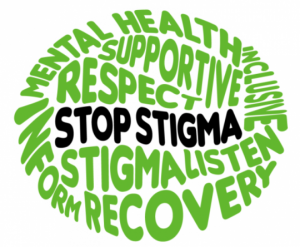March 30th, 2023
The Silent Enemy for those Facing Mental Health Issues
Understanding Stigma and Mental Health sadly, many who face mental illness must also cope with internal and external stigma. Simply speaking stigma is defined as “a mark of shame.” For people with a mental health disorder, this means being treated differently socially, in their school/job, in the legal system and even in the medical setting. This can lead to humiliation, reluctance to seek help or follow treatment recommendations, and ultimately results in poor overall health status and well-being.
Having a Mental Health Condition is Common
Many of us have depression or anxiety, or have a family member, friend, or colleague with a mental health issue. Famous people, such as athletes or musicians are not immune either. If you are struggling with a mental health issue, you are not alone.
NAMI reports for the US in 2019:
- Mental Illness: 20.6%
- Anxiety Disorders: 19.1%;
- Major Depressive Episode: 7.8%.
The Pandemic has magnified mental health problems. According to Mental Health America, the number of people screening with moderate to severe symptoms of depression and anxiety has continued to increase throughout 2020 and remains higher than rates prior to COVID-19.
Understanding Stigma and Mental Health
Historic medical system examples, (cancer and HIV), mental health stigma can be explained as an irrational fear of a group or individual who is “different” than the majority. Contributing factors and negative attitudes stem from:
- Not understanding the causes of the illness
- Not clearly understanding the mechanisms that treat these conditions
- Misunderstanding of the disease and impacts
– For example, believing that those with schizophrenia are violent - A focus on behaviors of those who may be in a crisis or not taking their medication, and assuming this is the norm
Not all mental illnesses are treated equally
- ADHD and Anxiety seem to have greater levels of acceptance. Many view anxiety as a normal response to stress
- Psychosis, bi-polar disorder, borderline personality disorder and depression are more stigmatized
- Regarding depression, the way people behave when they are depressed is hard for others to understand. Many falsely associate depression with a moral impairment or lack of willpower. “Why can’t they just get over it?”
Impacts of Stigma and Understanding Stigma and Mental Health
Medical system impacts
- Limits on access to care
- Issues with accurately diagnosing the patient’s health issue
– Providers may hyper-focus on the mental health diagnosis and ignore other relevant clinical data - Mental health is sometimes treated in a silo instead of in an integrated manner
– Other medical providers cannot use mental health information in their care plans if the mental illness is not disclosed or documented in the record
Patient level impacts
- Low self-esteem and high levels of shame
- Avoidance of help
- Non-compliance with medications
- Poor mental health outcomes
- Impacts on over-all medical status for those with other medical conditions
– “Syndemics” describes a situation in which those with co-morbid conditions (or poor social determinants of health) have worse health outcomes. If mental health is one of the conditions, it has a real impact - Relationship issues
- Impacts on work and general ability to thrive
How to Help with Stigma
System-level system interventions
- Care integration
- Better education on mental illness in training and continuing education
- Improved public health communications campaigns for staff and patients
– Messaging reminding people that mental health conditions are medical diseases - Ensure that patients know they are accepted, respected and supported
- Public policy and legal efforts:
– ADA and accommodation
– Parity laws
Individual-level actions
- Know the facts. Educate yourself about mental illness
- Be aware of your attitudes and behavior. Examine your own judgmental thinking, reinforced by upbringing and society
- Choose your words carefully. The way we speak can affect the attitudes of others
- Educate others. Pass on facts and positive attitudes; challenge myths and stereotypes
- Focus on the positive. Mental illnesses are only part of anyone’s larger picture
- Support people. Treat everyone with dignity and respect; offer support and encouragement
- Include everyone. It’s against the law to deny jobs or services to anyone with these health issues
-Adapted from the Center for Addiction and Mental Health (CAMH)
Resources
General stigma resources
McLean Hospital – Deconstructing Stigma-Changing Attitudes about Mental Health
MakeITOK.org – Stop the Stigma of Mental Health
NAMI – How to Love Someone with Mental Illness
BMC Medicine – Stigma in Health Facilities: Why it Matters and how we can Change it
Health Care Management Forum – Mental Illness-related Stigma in Healthcare
Mental health stigma in healthcare workers
Shannon E. Scott-Vernaglia, MD – MGH TedX -It’s OK not to be OK”
Psychiatric Times – Help Our Healers Heal: Reflections on Stigma amongst Health Care Professionals
Technology Networks – Exploring Mental Health in Academia
MedPage Today – We Must Address the Mental Health Crisis among Medical Professionals
Suicide supports
- National Suicide Prevention Lifeline
- Helpline 800-273-8255
- Samaritans – Suicide Prevention
Helpline: 877-870-4673 - The Trevor Project (LGBTQ Teen Crisis and Suicide Hotline)
1-866-488-7386 - Teen Crisis Line
1-800-852-8336 - Veterans Crisis Line
1-800-273-8255
Confidential assistance with for a mental health issue for you or someone you care about, contact EBS-EAP at 866-755-9980
Tags: Mental Health Issues, Understanding Stigma


Comments are closed.